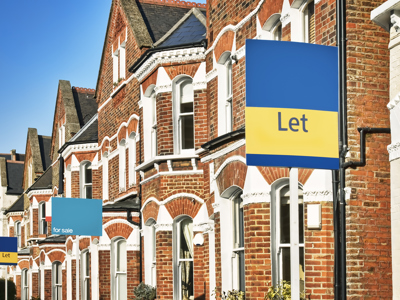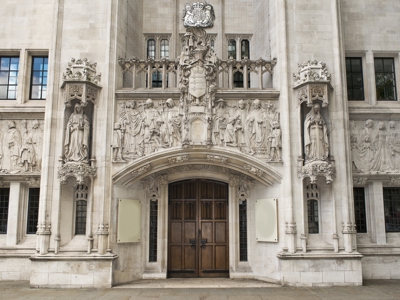Single dad challenges government on shortfall between the housing element of Universal Credit and soaring rent costs
The dad of a neuro diverse teenager is challenging the Secretary of State for Work and Pensions over the shortfall between his maximum entitlement to the housing element of Universal Credit and soaring rental costs, caused by the Local Housing Allowance (LHA).
Posted on 20 November 2023
The 47-year-old from Lincolnshire, who we have called Michael, cannot afford to live in a small two-bedroom rented house for him and his 14-year-old son because the £625 monthly rent is £172 a month higher than the £452.49 maximum LHA that he receives in housing element.
Now Michael has launched a legal challenge to the freeze to the LHA that has been in place since April 2020. He says the Government decision not to increase the LHA in line with soaring rental costs is unlawful and discriminatory.
Michael is a Royal Air Force veteran who suffers poor mental health. His eldest son also requires additional care from Michael due to his neuro diversity. These circumstances mean that Michael cannot as easily escape his rental shortfall (through, for example, work or a house move).
Michael became homeless over the summer and urgently required a property for him and his eldest son to live in. He turned to his local authority for help but they suggested they could only provide either temporary hotel accommodation or a totally unsuitable property which was a significant distance from his children’s mother and other siblings.
Michael and his former partner have three children. Their eldest son lives with Michael and their youngest son, aged eight, comes to stay with him regularly on a shared custody basis. Their daughter lives with her mother.
Following an exhaustive search of the local housing market, Michael and his eldest son moved into their privately rented house in August 2023 with financial help from Michael’s mother, expecting that his housing element would cover the rent. It was the cheapest privately rented property Michael could find in his local area. He had to stay local so his children could be near to their mother and their schools.
However, when Michael received his first housing element payment it became clear that there was a significant shortfall between the LHA and his monthly rent.
The charity Shelter believes that hundreds of thousands of people could be in a similar plight, unable to meet their housing costs because of the freeze in LHA which determines the maximum amount of housing benefit people can claim.
Represented by Leigh Day solicitor Lucy Cadd, Michael has sent a pre-action protocol letter to the Secretary of State which signals the start of the judicial review process.
The letter outlines Michael’s legal claim, stating that the freeze to the LHA means the LHA fails to fulfil the purpose of the housing benefit scheme; the Work and Pensions Secretary has failed in his duty to find out if the LHA is fulfilling its purpose; the freeze is irrational; and it has led to a breach of Michael’s human rights.
The LHA was originally established in 2008, to cover the bottom half (50th percentile) of the rental market in any area. This meant it was intended to match the market rent that low-income families would typically pay in a local area.
In 2011, the LHA was reduced – it would now cover the cost of rent at the 30th percentile of each local market. Since 2013 the government made various changes to it which resulted in the LHA having almost no connection at all to the 30th centile of rent. It was again raised to the level of the 30th centile in 2020 because of the financial pressures of the pandemic.
However, since March 2020 this government’s policy has been to freeze the LHA year on year. For individuals claiming housing benefit, this means that whilst housing costs have soared in line with a heated property market, the LHA has not increased at all.
Michael’s situation is typical of 95 per cent of England, according to a report by Shelter which says that only five per cent of homes on the market in England are affordable to recipients of housing benefit.
Michael’s letter cites the 2020 research report by Shelter, LHA Impact Assessment, which shows that landlords have not lowered rent to reflect the significant lowering of the LHA. Instead, the impact of the restrictions on the LHA levels has all been shouldered by the
recipients of housing benefit and it has had a significant and detrimental impact on people’s day to day lives. In order to keep their homes, many households have had to dip into their subsistence benefits to top up their rent, take out loans and accrue debts to meet living costs, cut back on food and heating, or have been forced to move into overcrowded, smaller, cheaper properties.
Michael said:
“I decided to challenge the Government’s decision to freeze the LHA because it is a cruel and unjust policy that causes poverty and misery for thousands of good people, including those most vulnerable. It causes more problems than it claims to solve, and, I believe, was disingenuously implemented to transfer the pains of decades of economic mismanagement away from those responsible, and onto those least able to bear it.”
Leigh Day solicitor Lucy Cadd said:
“The three-year freeze to LHA rates at a time when rents are increasing at lightning speed has created a broken system in which recipients of housing benefit are forced to live in unaffordable and/or unsuitable housing. They are thus given no choice but to make up their rental shortfall out of their already insufficient subsistence benefits.
“In addition, the ongoing freeze has an incredibly unfair impact on people who, due to their particularly vulnerabilities, are less able to escape the shortfall between their rental liability and their housing benefit award. Michael, and many other people in a similar position to him, are already having an extremely tough time making ends meet due to the ongoing cost-of-living crisis.
“Against the backdrop of soaring rents and inflation the fact that the Secretary of State has not increased the LHA to properly reflect the cost of rent at the 30th centile since 2020 is nothing short of dysfunctional and callous.”

Is the freeze to the Local Housing Allowance since April 2020 unlawful?
Lucy Cadd considers whether the stark choices facing tenants, and people who want to be tenants, mean that the effective cut in housing benefit while rents have soared is unlawful.

Man wins Supreme Court bedroom tax case
The Supreme Court has today ruled in favour of a man, known as RR, who brought a legal case regarding whether social security tribunals and local authorities have the power to provide effective remedy to benefits claimants where the application of the bedroom tax breaches their rights under the Human Rights Act.

